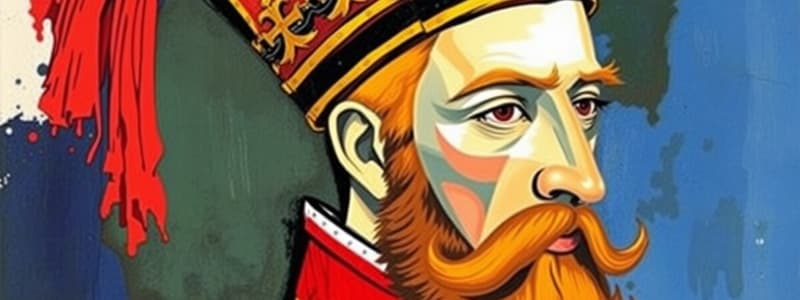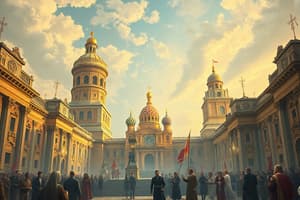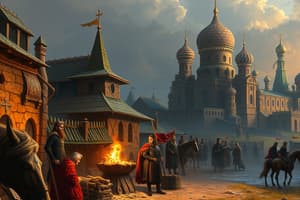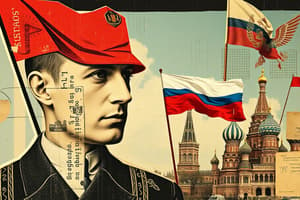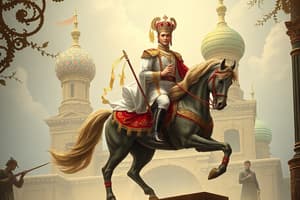Podcast
Questions and Answers
What reputation did Alexander II earn due to the Emancipation Edict of 1861?
What reputation did Alexander II earn due to the Emancipation Edict of 1861?
- The Tsar Autocrat
- The Tsar Democrat
- The Tsar Reformer
- The Tsar Liberator (correct)
Which change did Alexander II make to the central government structure in 1861?
Which change did Alexander II make to the central government structure in 1861?
- Abolished the Personal Chancellery (correct)
- Established a parliamentary system
- Increased the power of the nobility
- Created a federal government
What was a key criticism of the local government reforms introduced by Alexander II through the Zemstva?
What was a key criticism of the local government reforms introduced by Alexander II through the Zemstva?
- They were too democratic
- They eliminated local governance altogether
- They maintained the administrative monopoly of the nobility (correct)
- They were dominated by the bourgeoisie
Historians have differing views on Alexander II's reforms. Which perspective suggests he intended to grant more liberties?
Historians have differing views on Alexander II's reforms. Which perspective suggests he intended to grant more liberties?
What was one significant outcome of the emancipation of the serfs related to local government?
What was one significant outcome of the emancipation of the serfs related to local government?
What was a common perception about Alexander II's governance after the introduction of reforms?
What was a common perception about Alexander II's governance after the introduction of reforms?
What did the liberal members of the Zemstva criticize regarding the government?
What did the liberal members of the Zemstva criticize regarding the government?
What legacy is debated among historians regarding Alexander II's reforms?
What legacy is debated among historians regarding Alexander II's reforms?
What was one significant outcome of the creation of the Zemstva?
What was one significant outcome of the creation of the Zemstva?
Which historian argued that opposition to Alexander II was a logical result of his reforms?
Which historian argued that opposition to Alexander II was a logical result of his reforms?
What event in 1877 led to the long-term imprisonment of key Populists?
What event in 1877 led to the long-term imprisonment of key Populists?
Which of the following statements reflects the nature of Alexander II’s government?
Which of the following statements reflects the nature of Alexander II’s government?
What was the ultimate aim of the reforms implemented during Alexander II’s reign?
What was the ultimate aim of the reforms implemented during Alexander II’s reign?
What happened to the Populist movement after the failure of their efforts in 1874?
What happened to the Populist movement after the failure of their efforts in 1874?
What led to the eventual assassination of Alexander II?
What led to the eventual assassination of Alexander II?
Which historian questioned the idea that the Populists were completely unsuccessful?
Which historian questioned the idea that the Populists were completely unsuccessful?
How did repression under Alexander II differ from that of his successors?
How did repression under Alexander II differ from that of his successors?
Flashcards are hidden until you start studying
Study Notes
Nature of Alexander II's Government
- Alexander II known as the 'Tsar Liberator' primarily due to the Emancipation Edict of 1861 which aimed to free the serfs.
- Historians debate whether reforms granted real liberty or were mere concessions to gain support while maintaining autocracy.
- J.N. Westwood argues that Alexander II relieved many people despite being autocratic and conservative.
- Critics emphasize the limits of reform, asserting Alexander was fundamentally an autocrat focused on preserving power.
- The Personal Chancellery of his Imperial Majesty abolished in 1861, replaced by a Council of Ministers, giving a façade of willingness to discuss policy.
- Zemstva introduced as local government reforms intended to decentralize power but remained largely dominated by the nobility.
- Liberal members of the Zemstva began to question the government's responsiveness, revealing flaws in democratic involvement.
- The effectiveness of Zemstva noted in education, public health, and local economies, but it also detracted attention from central government reform.
Opposition and Repression
- Increased opposition to Alexander II interpreted as a response to reforms, leading some historians to see assassination as a likely outcome.
- Tom Kemp states that reforms led to a rise in educated critics of the regime.
- Orlando Figes connects the creation of Zemstva to the emergence of the Populist movement that resorted to revolutionary terror after failing to gain peasant support.
- Several assassination attempts on Alexander II, culminating in his successful assassination on March 1, 1881.
- J.N. Westwood posits that opposition dynamics fluctuated due to tsarist repression, notably during the 'Trial of the 50' in 1877 which imprisoned key Populists.
- Geoffrey Hosking argues that engaging with peasants allowed for the spread of radical ideas, indicating some success for the Populist movement.
Conclusion on Governance
- Despite reforms, Alexander II's government remained fundamentally autocratic with no significant changes to the central authority structure.
- Ministers had limited power and could be easily dismissed; no national body was available for policy discussion.
- Repression used as a tool to suppress dissent, maintaining autocratic control rather than genuinely liberal governance.
- Comparison with later tsars like Alexander III and Nicholas II reveals a consistent effort to maintain autocracy, albeit through different methods.
- Alexander II's attempts at reform and subsequent retrenchment led some historians to view him more favorably in retrospect, though he remained committed to autocracy just like his predecessors and successors.
Studying That Suits You
Use AI to generate personalized quizzes and flashcards to suit your learning preferences.
